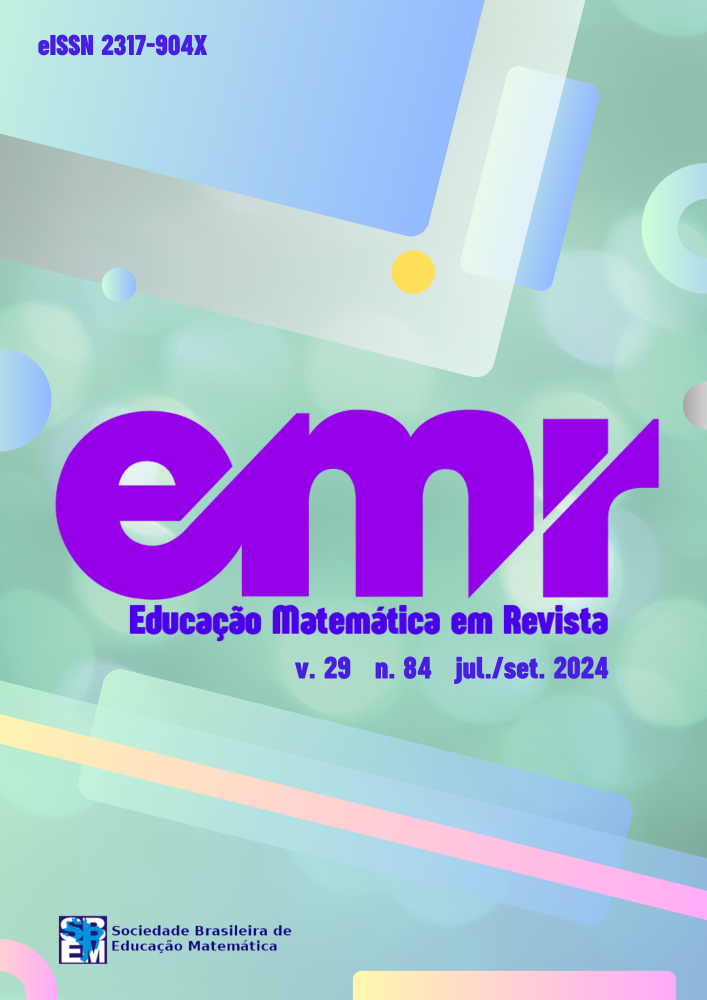O Legado do Rei: a digital game for teaching affine function
DOI:
https://doi.org/10.37001/emr.v29i84.3598Keywords:
Digital Games, RPG, Mathematics Teaching, Linear Functions, CreationAbstract
This article aims to promote reflections based on the process of an authorial digital game directed to the teaching of affine function. The digital game in question, entitled O Legado do Rei (The Legacy of the King), was developed with the intention of presenting a proposal that distances itself from the content perception that permeates and mischaracterizes educational practices related to the game. As a result, a role-playing game was created whose story adapts through the player’s decisions, allowing for three different endings. It is noted that, during the game’s development, the goal was to seamlessly integrate mathematics into the fictional universe, avoiding presenting it in an aggressive and immediate manner to the player. For this, in-game puzzles are used so that the disciplinary content presents itself as a problem-solving bias that is part of the in-game reality.
Downloads
References
BRASIL. Ministério da Educação. Base Nacional Comum Curricular. Brasília, 2018.
DE AGUIAR, Bernardo Cortizo. O Foco Lúdico: O papel do jogador dentro da narrativa dos jogos sob o prisma do foco narrativo. XII Simpósio Brasileiro de Games e Entretenimento Digital. São Paulo, SP: [s.n.]. 2013.
FEENBERG, Andrew. O que é a filosofia da tecnologia. In: NEDER, Ricardo T. A teoria crítica de Andrew Feenberg: racionalização democrática, poder e tecnologia. Brasília. Observatório do Movimento pela Tecnologia Social na América Latina / CDS / UnB / Capes, 2010. Disponível em: https://www.sfu.ca/~andrewf/ coletanea.pdf. Acesso em: 10 ago. 2023
FIORENTINI, Dario; MIORIM, Maria Ângela. Uma reflexão sobre o uso de materiais concretos e jogos no Ensino da Matemática. Boletim da SBEM-SP, v. 4, n. 7, p. 5-10, 1990.
GLASS, Geofrey; XIN, Cindy; FEENBERG, Andrew. Technology and the Experience of Education. European Journal of Social Behaviour, [s. l.], v. 2, n. 2, p. 36-52, 2015. Disponível em: https://zenodo.org/record/581679#.Xd3AWOhKjIU. Acesso em: 10 ago. 2023
HUIZINGA, Johan. Homo Ludens. 8. ed. São Paulo: Perspectiva, 2017. 256 p.
KLOPFER, Eric et al. Augmented learning: research and design of mobile educational games. MIT press, 2008.
MCGONIGAL, Jane. Reality is broken: why games make us better and how they can change the world. Penguin, 2011.
PAULA, Bruno Henrique de. Jogos digitais como artefatos pedagógicos: o
desenvolvimento de jogos digitais como estratégia educacional. 2015. 227 f.
Dissertação (Mestrado) – Curso de Artes Visuais, Unicamp, Campinas, 2015. Disponível
em: http://repositorio.unicamp.br/jspui/handle/REPOSIP/285203. Acesso em: 25 abr.
SCHELL, Jesse. The art of game design: a book of lenses. Burlington: Morgan Kauffman Publishers, 2008.
SILVA, Ívens Matozo. Literatura e violência: considerações sobre a narrativa brasileira contemporânea. Revista Linguagens & Letramentos, v. 3, n. 2, p. 23-34, 2019.
TONÉIS, Cristiano Natal. A lógica da descoberta nos jogos digitais. 2010. 210 f. Dissertação (Mestrado) – Curso de Mestrado em Tecnologias da Inteligência e Design Digital, Pontifícia Universidade Católica de São Paulo, São Paulo, 2010.
Published
How to Cite
Issue
Section

This work is licensed under a Creative Commons Attribution-NonCommercial-ShareAlike 4.0 International License.






